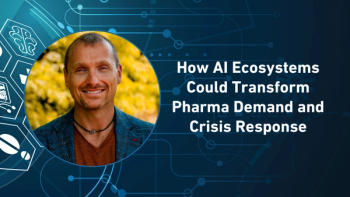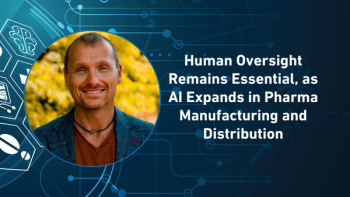
- Pharmaceutical Commerce - November/December 2011
A conversation with Steve Collis, AmerisourceBergen CEO
Last summer, AmerisourceBergen effected a milestone transfer of leadership—from the company’s founding merger in 2001 under R. David Yost, to his successor, Steve Collis. Collis, a 17-year company veteran, had been president of AmerisourceBergen Specialty Group, and then COO of the entire corporation. AmerisourceBergen comprises Drug Corporation (ABDC), Specialty Group (ABSG), and Consulting Services (ABCS), with operations in the US, Canada and Great Britain.
1. Let’s start with a snapshot of AmerisourceBergen today; it appears to have been another good year in a string of good years for ABC’s business. Do you have a positive outlook for the year as a whole and going forward?
AmerisourceBergen is wrapping up one of its strongest years ever with14-15% growth on top of 31% growth last year. That’s not to say we won’t have challenges in the coming years. Our long term growth hopes to have a 15% growth annually, but we will have to look for that growth from other places, particularly with our emphasis on operating margins and our strong balance sheet control.
It will be an interesting and challenging year for us. As we stated in July, we expect 2012 to be a similarly good year, with many new generic introductions, and opportunities in specialty pharmaceuticals. We are implementing a new SAP system and are making changes to our approach in customer service, making it easier for our customers to do business with us. We expect those changes will enable us to offer new services and to capture value for our customers. Recently, we’ve made some new acquisitions and we expect to manage them well to offer more value for our manufacturer partners and maintain our productivity momentum.
AmerisourceBergen is wrapping up one of its strongest years ever, with 30% growth in earnings, whereas we had been giving guidance expecting something like 10% growth. We won’t be able to sustain that indefinitely; our long term goal is to have 15% growth in earnings annually—and there’s not many large US companies today that can put up those sorts of numbers. It will be an interesting year for us. As we stated in July, we expect 2012 to be a similarly good year, with many new generic introductions, and opportunities in specialty pharmaceuticals. We are finishing the implementation of a new SAP system and expect that to enable us to offer new services and to capture value for our manufacturing clients. We have some new acquisitions and we expect to manage them well and maintain productivity momentum.
2. You’ve taken the helm of ABC after 10 years of leadership by its founder, Dave Yost. What has the transition been like for you personally?
In all sincerity, I have to give full credit to Dave who built the AmerisourceBergen business and created a strong team to manage it. Shortly after taking over, I participated in a new CEO program at Harvard University. One of the things we discussed is that the best management transitions occur when you promote from within.
With our current management team, we are confident that we have the right people at the table—experienced, strong leaders who collaborate well. Collaboration is one of my key management tenets (see Table) and with managers like Dave Neu (ABDC) and Peyton Howell (ABCS) and James Frary (ABSG), we have many strengths. Collaboration means that we will take the best practices from one area, (such as our strong relationships in managing reimbursement in oncology) and apply that to other areas of our business.
As CEO, I have learned that the old cliché is true—the buck stops with you. Ultimately it’s your judgment that has to be applied. But it takes us back to the need for collaboration. We make decisions at the table—together.
Personally, my family and I moved from Texas (headquarters of AmerisourceBergen Specialty Group, which Collis headed prior to being promoted to COO) two years ago. We were very comfortable living in Texas for 14 years; and the living in Pennsylvania certainly has its appeal, but the first winter—was certainly different for us! My family has settled into the Philadelphia area and the community is welcoming.
I have three children, two in high school and one in elementary school. We’re becoming involved in the community, partly through AmerisourceBergen’s community-relations efforts, which emphasize assisting in health-related areas.
3. Very quickly after the transition, AmerisourceBergen announced three significant acquisitions (TheraCom, Premier Source and IntrinsiQ). Can you talk about the rationale for these acquisitions, and what they mean for pharma manufacturers?
These acquisitions were in the works well before the transition, and come about through some serious diligence, hard but fair negotiations and the best value for our shareholders. All three companies are best-in-class and are exactly the sort of acquisitions that help differentiate us from our competition and offer a better value to our clients, both manufacturers and healthcare providers. TheraCom has extensive experience in outcomes, in general and in the pharmacy benefits management reimbursement field, and will give our existing capabilities in our consulting services, a new breadth and scope.
IntrinsiQ helps oncologists with therapy decisions and appropriate care, and helps manufacturers with data on clinical outcomes and product utilization. Premier Source has expertise on market access for therapies and medical devices.
Pharma manufacturers are dealing with much more complex commercialization practices, such as REMS (Risk Evaluation and Mitigation Strategies), molecular diagnostics and biomarkers and the like. We have a good track record in bringing in acquisitions and making them strong collaborative resources for our clients, and we have high expectations for these acquisitions.
4. Do these acquisitions represent an expansion of AmerisourceBergen beyond distribution services? Will AmerisourceBergen become a bigger part of the overall healthcare ecosystem going forward?
The key need for healthcare overall is to drive innovation and value in commercial and clinical channels. The recent acquisitions differentiate us and increase our stickiness with customers. As a wholesaler, we have highly efficient operating practices, particularly for our distribution business, and we will transfer some of that knowledge to other areas of business.
Part of what healthcare reform points to is shorter payment cycles in reimbursement for healthcare providers and much higher focus on patient reporting and patient outcomes AmerisourceBergen associates have the tools and resources to face the future of healthcare reform and will have a significant impact on patient health Our existing businesses, as well as these acquisitions, represent our intentions to bring creative solutions to all of these problems.
We’re also looking at how we can collaborate with healthcare clients outside the US. We have strong existing business as a wholesaler in Canada, and we have clinical packaging operations in Wales to serve the EU. It’s much harder to find synergies with basic distribution internationally, but the consulting services we offer to manufacturers will be relevant for many demographics. We’ve routinely entertained delegations from abroad—most recently from China and Europe—and I’m honored to be asked to be the keynote speaker at the European Assn. of Pharmaceutical Full-Line Wholesalers (GRIP) that will occur in early 2012. Among other things, our experience in specialty pharmaceutical distribution will have value in markets all over the world.
5. ABC is known for its close affiliation with independent pharmacies, and its Good Neighbor Pharmacy franchise. What do you see for the future of independent pharmacy?
Independent pharmacy is a profession whose participants are answering a higher calling. They’re an integral part of healthcare in America and we value them tremendously. A personal story I tell: shortly after coming to the Philadelphia area, my family dog had need of specialized veterinary care and a medication that needed to be compounded. On a Friday night, as my wife and I were going out to dinner, we dropped off a prescription at a local pharmacy—our affiliation with AmerisourceBergen was not a factor. The pharmacy called us back in an hour and a half to tell us the prescription was ready. That’s the level of service you don’t typically expect from retail pharmacies. Independent pharmacists take the time to know their customers’ and their communities’ needs, and this particular pharmacy met our needs.
We support independent pharmacy with a host of business and coaching services in addition to timely drug distribution. It’s in everyone’s interests that independent pharmacies continue to thrive and see adequate reimbursement for their services. One thing that we’ll do a better job of in the future is representing the community pharmacists’ interests in Washington, where Medicare and Medicaid reimbursement policies can affect them very directly.
6. Finally, 2011 is the 10th anniversary of ABC as a corporate entity—congratulations! Care to conjecture what healthcare, and ABC, will look like at ABC’s 20th anniversary?
From when it came together in 2001 to now, AmerisourceBergen has doubled in size to approximately $80 billion in annual revenue. Every day, about $300 million worth of products are flowing through our distribution centers to the market. It’s a tremendous responsibility, and it keeps me humble to ensure that this function is maintained and patients continue to have access to medications. We will continue to work to make the pharmaceutical supply chain safe and efficient. Our primary focus will remain on being an essential partner to industry. PC
Articles in this issue
about 14 years ago
CMS issues Sunshine Actabout 14 years ago
More actions by GPhA and Obama Administration to address drug shortagesabout 14 years ago
Cold Chain Technologies extends ambient-temperature packaging lineabout 14 years ago
UPS Healthcare Logistics adds to network with an Italian acquisitionNewsletter
Stay ahead in the life sciences industry with Pharmaceutical Commerce, the latest news, trends, and strategies in drug distribution, commercialization, and market access.




